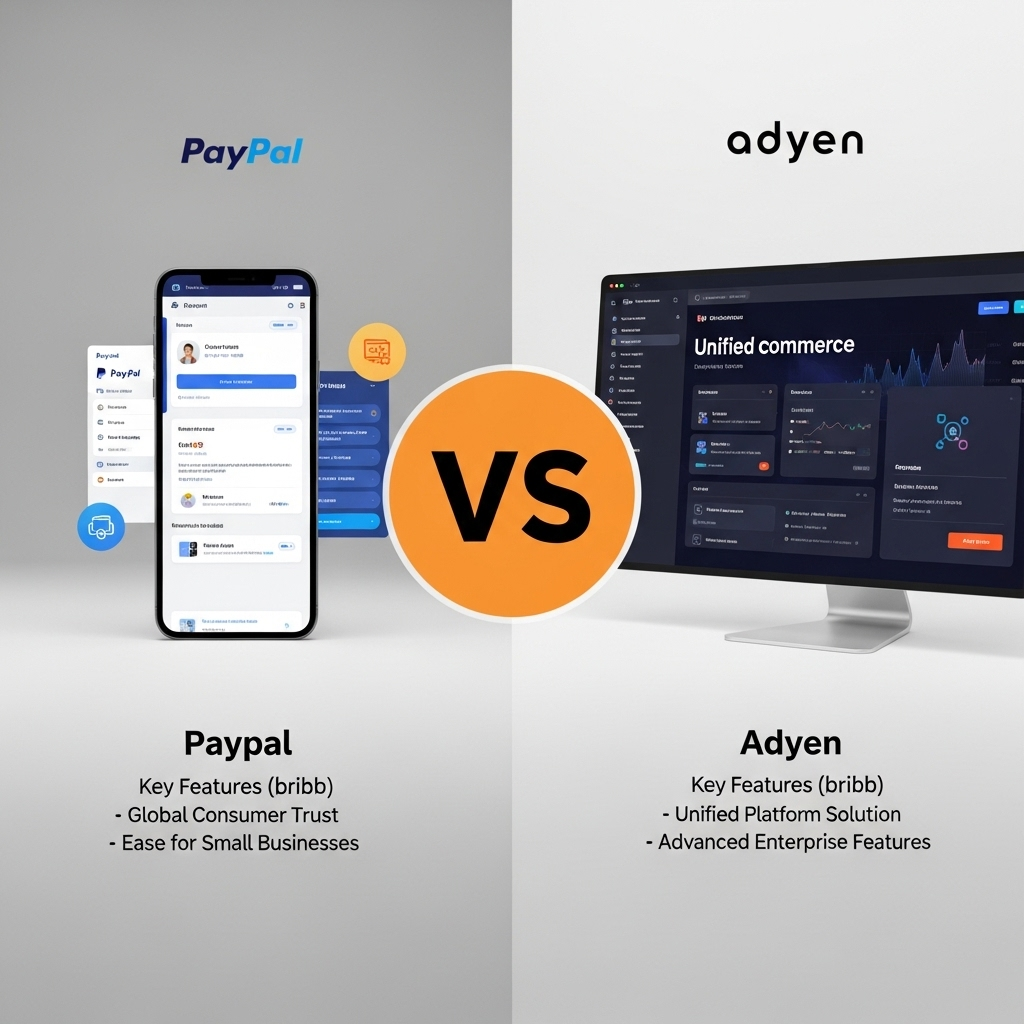Fintech companies > PayPal vs. Adyen
Selecting the right payment processor is crucial for businesses of all sizes. PayPal and Adyen are two leading platforms, each offering distinct features, pricing structures, and global capabilities. This comparison highlights their key differences to help you make an informed decision.
This comparison analyzes real-world performance, user feedback, and key differentiators to help you make an informed decision.
Quick Verdict
Adyen is generally better suited for larger businesses needing transparent pricing and advanced fraud protection, while PayPal is a solid choice for smaller businesses or individuals prioritizing ease of use and wide acceptance.
- Adyen offers a more transparent Interchange++ pricing model, while PayPal's fees are more complex and can vary significantly.
- Both platforms provide robust security and fraud protection, but Adyen's RevenueProtect offers more advanced customization.
- PayPal has broader global reach, but Adyen is rapidly expanding its global acquiring solutions.
Who Should Choose Which?
Choose PayPal if:
Businesses seeking ease of integration, broad customer familiarity, and a wide range of payment options, particularly for smaller transactions.
Choose Adyen if:
Larger enterprises requiring transparent pricing, advanced fraud management, and global acquiring capabilities for high-volume transactions.

Key features – Side-by-Side
| Attribute | PayPal | Adyen |
|---|---|---|
| Transaction Fees | Varying fees based on transaction type, ranging from 2.29% to 3.49% + $0.49 for businesses, plus additional fees for international transactions and chargebacks. | Interchange++ model, with processing fees typically ranging from €0.10–€0.15 per transaction. Card transactions involve a fixed fee (around £0.11) plus a variable percentage (often 0.60%) plus the interchange fee. |
| Payment Methods Supported | Supports bank accounts, Visa, Mastercard, Discover, American Express, PayPal balance, PayPal Credit, and Venmo (in the US). | Extensive support for credit cards, debit cards, online banking, e-wallets, prepaid cards, and cash/bank transfer methods, including Visa, Mastercard, Apple Pay, PayPal, and Klarna. |
| Global Coverage | Available in over 200 countries and regions, supporting payments in over 100 currencies, though some countries have limited payout features. | Presence in Europe, Latin America, North America, and the Asia-Pacific regions, offering global acquiring solutions and processing payments in multiple countries and currencies. |
| Integration Complexity | Offers various integration methods from simple payment buttons to full API and SDK access, with interactive integration guides and documentation. | Provides developer resources, plugins for various e-commerce platforms, libraries, SDKs, and APIs to facilitate integration. |
| Security Measures | Employs encryption, two-factor authentication, account monitoring, secure connections (TLS and HTTPS), and compliance with PCI-DSS. | Implements technical and organizational measures, undergoes independent audits and certifications (like PCI-DSS and SOC 2), and has an incident response program with 24/7 monitoring. |
| Fraud Protection Capabilities | Utilizes a fraud detection system, fraud scoring system, and chargeback protection programs. | Offers RevenueProtect, its fraud engine, with flexible rule-building and detection tools, machine learning, 3D Secure, device fingerprinting, and behavioral analytics. |
| Reporting and Analytics | Provides reporting tools for transaction-level insights and a dashboard for a visual representation of payments, revenue, and chargebacks. | Offers reporting and analytics to track payment performance and identify trends. |
| Customer Support Quality | Offers a resolution center for transaction and account issues and customer support through various channels. | Uses guidelines to ensure platforms comply with customer support responsibilities, offering support by phone or similar channels and email. |
| Scalability | Designed to handle increasing transaction volumes and accommodate more users and higher peak loads, using cloud technologies for elasticity. | Platform can scale to handle growing transaction volumes and business needs. |
| Payout Options | Transfer to linked bank account (standard or instant), transfer to eligible debit card, request a check by mail, and withdrawal using the PayPal Debit Card at ATMs. | Offers payouts combined with payments processing, allowing payouts to bank accounts and cards, with options for scheduled or on-demand payouts. |
| Compliance Standards | Adheres to stringent security certifications and compliance standards, including PCI-DSS. | Undergoes independent verification of its security and compliance controls to meet regulatory and policy objectives, including annual third-party audits for PCI-DSS certification. |
| Developer Resources | Provides tools, resources, SDKs, and APIs for developers, including interactive integration guides, sample code, test cases, and helpful videos. | Offers extensive documentation, an API explorer, GitHub samples, Postman workspace, test cards, and SDKs. |
Overall Comparison
Pros and Cons
PayPal
- No notable advantages reported.
- No major disadvantages reported.
Adyen
- Supports various payment methods
- Global coverage
- Scalable platform
- Comprehensive security measures
- Advanced fraud protection capabilities
- Extensive developer resources
- No major disadvantages reported.
User Experiences and Feedback
PayPal
- No highlights reported.
- No major complaints reported.
- No value feedback reported.
Adyen
- No highlights reported.
- No major complaints reported.
- No value feedback reported.
Frequently Asked Questions
Which platform has lower transaction fees?
Adyen's Interchange++ pricing model can often result in lower fees for high-volume transactions, but it depends on the specific transaction types and volumes.
Which platform is easier to integrate?
PayPal is generally considered easier to integrate, especially for simple payment buttons and smaller businesses.
Sources & Citations
- Official product specifications
- Expert reviews from tech publications
- User feedback from online forums
Information gathered through AI-assisted web search and analysis. Last updated: September 2025
Methodology & Transparency
Our comparison methodology combines multiple data sources to provide comprehensive, unbiased analysis:
- Data Collection: We gather information from official specifications, user reviews, and independent testing
- AI-Assisted Analysis: Advanced AI helps process large amounts of data while maintaining accuracy
- Human Oversight: All comparisons are reviewed for accuracy and relevance
- Regular Updates: Content is refreshed to reflect new information and user feedback
- Bias Mitigation: We strive for objectivity by considering multiple perspectives and sources
Versusly.ai uses AI-assisted content generation combined with human oversight to deliver comprehensive comparisons. We are transparent about our process and continuously work to improve accuracy and usefulness.